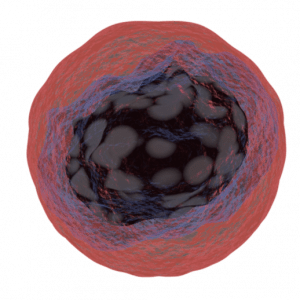Anahita Kodali 23′

Cancer is one of the world’s most prevalent diseases. The National Cancer Institute estimates that over 38% of men and women will be diagnosed with cancer in their lifetime; cancer costs the US over 140 billion dollars annually [8].
Image Source: Wikimedia Commons
The first of the 6 papers provides an overview of the entire dataset; there are contributions from all head authors and researchers involved in the Consortium. It reports that on average, cancer genomes carry four to five drivers – active oncogenes and defective tumor-suppressors – which give these cells selective advantages [2]. The remaining papers in the consortium focused on specific aspects of cancer genomics and were spearheaded by specific researchers.
The second paper was authored by Esther Rheinbay, Morten Muhlig Nielsen, Federico Abascal, Jeremiah Wala, and Ofer Shapira, a combined team from the Broad Institute of MIT and Harvard. It identifies genetic drivers in the non-coding regions of the genome – a topic that previous studies of cancer genomics have tended to neglect. The researchers came to several conclusions about mutation patterns, including data regarding frequently occurring mutations that cause the overexpression of telomerase; overexpression of telomerase in thte noncoding promoter region of DNA helps cause the uncontrollable division of cancer cells [3].
The third paper was authored by Ludmil Alexandrov, Jaegil Kim, Nicholas Haradhvala, and Mi Ni Huang of UCSD; the fourth was led by Yilong Li, Nicola D. Roberts, Jeremiah A. Wala, and Ofer Shapira of the Wellcome Trust Sanger Institute. Both studied genetic signatures, Mutations in DNA caused by processes such as DNA-repair errors or exposure to mutagenic environments; the groups of researchers ultimately found ninety-seven of these signatures [4, 5].
The fifth paper was authored by Moritz Gerstung, Clemency Jolly, Ignaty Leshchiner, Stefan C. Dentro, and Santiago Gonzalez of the European Molecular Biology Laboratory. They studied cancer evolution by reconstructing tumors through single biopsies, allowing researchers to conclude that common driver mutations most often form very early in tumor development. This finding suggests that as tumors continue to evolve, DNA-repair defects begin to play a much bigger role than the tumor’s environment [6].
The final paper was authored by the PCAWG Transcriptome Core Group. It linked DNA and RNA alterations, providing insight into the way that both DNA and RNA mutations work in combination to promote cancer. Every cell without DNA driver alterations, for example, had RNA-level alterations that contributed to cancerous growth [7].
The PCAWG papers represent a huge milestone in cancer research and are the product of dedicated work by thousands of researchers. Conclusions from these studies will surely lead to innovation in the field for years to come as scientists continue to develop a stronger understanding of cancer.
Bibliography
[1] Cieslik, M., & Chinnaiyan, A. M. (2020, February 5). Global genomics project unravels cancer’s complexity at unprecedented scale. Nature News. Retrieved from https://www.nature.com/articles/d41586-020-00213-2
[2] Campbell, P.J., Getz, G., Korbel, J.O. et al. Pan-cancer analysis of whole genomes. Nature 578, 82–93 (2020). https://doi.org/10.1038/s41586-020-1969-6
[3] Rheinbay, E., Nielsen, M.M., Abascal, F. et al. Analyses of non-coding somatic drivers in 2,658 cancer whole genomes. Nature 578, 102–111 (2020). https://doi.org/10.1038/s41586-020-1965-x
[4] Alexandrov, L.B., Kim, J., Haradhvala, N.J. et al. The repertoire of mutational signatures in human cancer. Nature 578, 94–101 (2020). https://doi.org/10.1038/s41586-020-1943-3
[5] Li, Y., Roberts, N.D., Wala, J.A. et al. Patterns of somatic structural variation in human cancer genomes. Nature 578, 112–121 (2020). https://doi.org/10.1038/s41586-019-1913-9
[6] Gerstung, M., Jolly, C., Leshchiner, I. et al. The evolutionary history of 2,658 cancers. Nature 578, 122–128 (2020). https://doi.org/10.1038/s41586-019-1907-7
[7] Calabrese, C., Davidson, N.R., Demircioğlu, D. et al. Genomic basis for RNA alterations in cancer. Nature 578, 129–136 (2020). https://doi.org/10.1038/s41586-020-1970-0
[8] Cancer Statistics. NIH National Cancer Institute (n.d.). Retrieved from https://www.cancer.gov/about-cancer/understanding/statistics

Leave a Reply